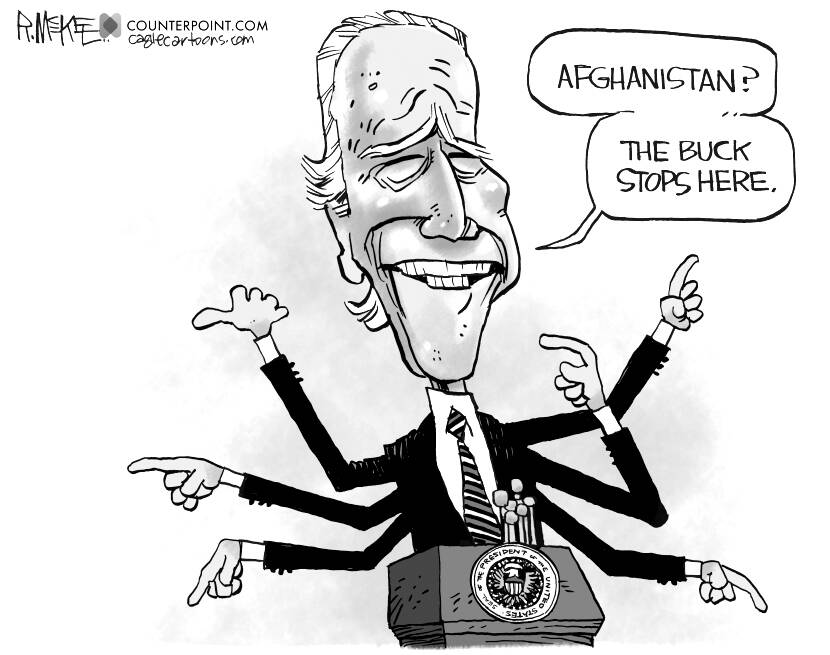At one point in his running, four-year war with the news media, former President Trump referred to it as “the enemy of the people,” a remark that rightfully drew a cascade of denunciations from news organizations, academics, members of Congress and the punditocracy that inhabits cable TV opinion studios.
The remark was needlessly provocative, inflammatory and profoundly stupid. It revealed the occupant of the highest elected office in the land and a leader of the free world as a petty, petulant, thin-skinned bully who sought refuge in insults and undisguised contempt for those who expressed views contrary to his.
Now, as President Biden is reeling from an onslaught of criticism for his administration’s chaotic handling of the military withdrawal from Afghanistan, those who gleefully belabored Trump and stoutly defended the media have turned on it, complaining bitterly that news organizations have become obsessed with the unfolding debacle and have unfairly and incorrectly blamed the president.
In a clear-cut case of the warning “Live by the media, die by the media,” last year’s cheerleaders have become this year’s boo birds.
Biden’s defenders have rushed to his side to refute those who disagree with the administration’s characterization of the withdrawal as a resounding success. The president handled the evacuation brilliantly, they argued, even in the face of horrific TV images of desperate Afghanis storming the airport in Kabul hoping to board a plane to safety.
The deaths of 13 American military personnel and nearly 200 Afghanis in a suicide bombing at an airport gate effectively destroyed the “resounding success” claims. Report piled atop report from sources deemed reliable and credible by the media that the administration was slow to react as the Taliban swept through the country, putting the Afghani forces to flight and seizing complete control in less than two weeks.
These reports were compounded by accounts of a divided White House and a president who disregarded the advice of his military leaders in his zeal to end American involvement in a 20-year war, the longest in the nation’s history. One of the more vocal critics of the coverage has been Philippe Reines, a longtime adviser to Hillary Clinton, who argued the media has deliberately treated Biden unduly harshly to justify its treatment of Trump and to prove it can be even-handed.
Reines, still suffering from the psychological trauma by Clinton’s defeat in 2016, was joined by longtime Clinton family political guru James Carville, who described the media coverage as “stupid and hysterical.” Biden has been supported by some in the media chattering class who pop up on Sunday morning talk shows to promote the administration narrative and in particular, to blame Trump for negotiating a lousy withdrawal deal with the Taliban in the first place.
But what must be most galling to the Biden team is the torrent of criticism from major media outlets who’ve been generally and often openly supportive in the past. If the administration expected they’d fall in line and dutifully record the White House crafted narrative, it was a glaring and naïve misunderstanding of the media’s foundational obligation to report as factually and accurately as humanly possible on a rapidly developing, perilous and chaotic sequence of events.
What reporters saw on the ground in Afghanistan and conveyed to their viewers and readers was often sharply at odds with the administration’s repeated assurances that the situation was under control and successful. There was simply too much visual evidence proving otherwise and reporting it was an example of journalistic professionalism and integrity, unsullied by partisan spin. While the president’s defenders had the good sense to avoid for the most part the low-level rhetoric employed by his predecessor, they went down the same path – blaming the media for reporting objectively and deviating from their preferred story line.
Biden was elected in significant measure because he was not Trump, a conclusion supported by post-election polling that showed a majority of his votes came from those who wanted Trump driven from the White House rather than out of a favorable response to Biden policies. Much remains to be seen and experienced before the final chapter in the Afghanistan tale is written. The situation is unsettled and will exert a lingering impact on American Politics – including the 2022 Congressional midterm elections.
What is irrefutable, though, is that the media has done its job and has nothing to apologize for.
Carl Golden is a senior contributing analyst with the William J. Hughes Center for Public Policy at Stockton University in New Jersey. You can reach him at cgolden1937@gmail.



